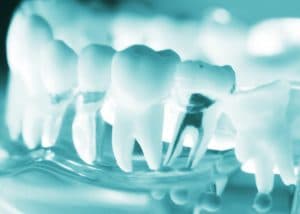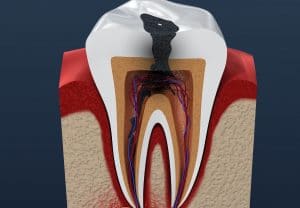 When many people develop tooth decay, they don’t usually think they’ll need root canal treatment to treat it. In most cases, tooth decay and the cavities that they cause can be successfully addressed with a more conservative, tooth-colored filling. However, when tooth decay progresses and becomes a more extensive problem, filing the cavity in your tooth may no longer be the appropriate solution. For more severe cases of tooth decay, your tooth may need more involved root canal treatment, which involves carefully removing the decay and infected tissues from within the tooth’s inner chamber and root canal. By removing the extensive infection from within the tooth, your root canal treatment can improve your chances of preserving the tooth and avoiding its loss or extraction.
When many people develop tooth decay, they don’t usually think they’ll need root canal treatment to treat it. In most cases, tooth decay and the cavities that they cause can be successfully addressed with a more conservative, tooth-colored filling. However, when tooth decay progresses and becomes a more extensive problem, filing the cavity in your tooth may no longer be the appropriate solution. For more severe cases of tooth decay, your tooth may need more involved root canal treatment, which involves carefully removing the decay and infected tissues from within the tooth’s inner chamber and root canal. By removing the extensive infection from within the tooth, your root canal treatment can improve your chances of preserving the tooth and avoiding its loss or extraction.
What to Do After You Lose a Tooth
 When you experience tooth loss, it may not always be clear what to do next. In many cases, losing a tooth is the result of another underlying oral health concern reaching its severe stages, such as gum disease or tooth decay. However, just because the tooth is lost doesn’t mean it’s the end of your smile’s concerns. Depending on the cause of it, you may need prompt treatment to stop it from growing worse. Also, you’ll need to replace the tooth to restore its proper role in your bite’s function. (more…)
When you experience tooth loss, it may not always be clear what to do next. In many cases, losing a tooth is the result of another underlying oral health concern reaching its severe stages, such as gum disease or tooth decay. However, just because the tooth is lost doesn’t mean it’s the end of your smile’s concerns. Depending on the cause of it, you may need prompt treatment to stop it from growing worse. Also, you’ll need to replace the tooth to restore its proper role in your bite’s function. (more…)
How to Avoid the Need for a Dental Crown
 When your tooth is compromised in a way that impacts a majority of its structure, a dental crown can often be the most effective and efficient way to restore and save the tooth. However, placing a dental crown also means modifying more of your natural tooth structure to accommodate it. For this reason, it’s often preferable to prevent significant damage to your tooth and the need for a full dental crown by addressing any tooth concerns early. (more…)
When your tooth is compromised in a way that impacts a majority of its structure, a dental crown can often be the most effective and efficient way to restore and save the tooth. However, placing a dental crown also means modifying more of your natural tooth structure to accommodate it. For this reason, it’s often preferable to prevent significant damage to your tooth and the need for a full dental crown by addressing any tooth concerns early. (more…)
Why Fillings Are Often the Best Choice for a Cavity
 Some dental treatments are better at addressing certain concerns than others. For example, if your tooth has a substantial fracture or break in it, then a custom dental crown might be the optimal solution for repairing and restoring the tooth. In the case of a cavity, which is a more common condition than extensive tooth damage, the most appropriate treatment will depend on the extent of your condition. For many patients, treating the cavity early means they have a higher chance of successfully restoring their tooth and oral health with a minimally invasive tooth filling. (more…)
Some dental treatments are better at addressing certain concerns than others. For example, if your tooth has a substantial fracture or break in it, then a custom dental crown might be the optimal solution for repairing and restoring the tooth. In the case of a cavity, which is a more common condition than extensive tooth damage, the most appropriate treatment will depend on the extent of your condition. For many patients, treating the cavity early means they have a higher chance of successfully restoring their tooth and oral health with a minimally invasive tooth filling. (more…)
Symptoms that Might Point to Obstructive Sleep Apnea
 Obstructive sleep apnea, or OSA, is the kind of condition that not everyone recognizes at first. For example, many people attribute the snoring that it causes to a simple snoring habit. Others might believe their daytime tiredness is just a normal case of being tired. However, these and other signs can often be a warning that your brain and body aren’t receiving the rest they need. This may be due to sleep apnea, which consistently interrupts your sleep and breathing cycles each night, often without you noticing it. (more…)
Obstructive sleep apnea, or OSA, is the kind of condition that not everyone recognizes at first. For example, many people attribute the snoring that it causes to a simple snoring habit. Others might believe their daytime tiredness is just a normal case of being tired. However, these and other signs can often be a warning that your brain and body aren’t receiving the rest they need. This may be due to sleep apnea, which consistently interrupts your sleep and breathing cycles each night, often without you noticing it. (more…)
How to Deal with a TMJ Disorder
 The only way to deal with most oral health concerns is to actively address them. If you have a cavity, it won’t stop growing until you treat it. If you develop gingivitis, it will continue progressing until you manage it. When you have a TMJ disorder, which impacts your jaw joints’ ability to function, the discomfort it causes and the potential damage to your oral structures will also continue to grow worse. Fortunately, your dentist may be able to help you effectively deal with your TMJ disorder in a comfortable and convenient manner. (more…)
The only way to deal with most oral health concerns is to actively address them. If you have a cavity, it won’t stop growing until you treat it. If you develop gingivitis, it will continue progressing until you manage it. When you have a TMJ disorder, which impacts your jaw joints’ ability to function, the discomfort it causes and the potential damage to your oral structures will also continue to grow worse. Fortunately, your dentist may be able to help you effectively deal with your TMJ disorder in a comfortable and convenient manner. (more…)
Signs that Your Dental Hygiene Isn’t as Good as You Think
 After spending so many years brushing and flossing your teeth every day and not developing a dental health concern, it’s easy to believe that your dental hygiene routine is as good as it can be. Because of this, many people are surprised when their dentists tell them that this isn’t exactly true, and that something like tooth decay or gum disease has developed. For many people, this occurs not because they completely neglect their dental hygiene, but because their dental hygiene routines aren’t as consistent as they need to be. Today, we examine a few signs that your dental hygiene routine could be better, and why you may need your dentist’s help to restore your good oral health. (more…)
After spending so many years brushing and flossing your teeth every day and not developing a dental health concern, it’s easy to believe that your dental hygiene routine is as good as it can be. Because of this, many people are surprised when their dentists tell them that this isn’t exactly true, and that something like tooth decay or gum disease has developed. For many people, this occurs not because they completely neglect their dental hygiene, but because their dental hygiene routines aren’t as consistent as they need to be. Today, we examine a few signs that your dental hygiene routine could be better, and why you may need your dentist’s help to restore your good oral health. (more…)
Steps You Can Take to Prevent Tooth Loss Better
 Though not everyone fully realizes it, tooth loss is highly preventable. With the right care and maintenance, and with regular care from their dentists, most people have an excellent chance of avoiding the loss of an adult tooth. In fact, most dental health care treatments focus on addressing oral concerns as conservatively as possible to improve your chances of preserving more healthy, natural tooth structure. Today, we examine a few steps you can take to prevent tooth loss more effectively, and what to do if you notice signs of trouble that could lead to it later. (more…)
Though not everyone fully realizes it, tooth loss is highly preventable. With the right care and maintenance, and with regular care from their dentists, most people have an excellent chance of avoiding the loss of an adult tooth. In fact, most dental health care treatments focus on addressing oral concerns as conservatively as possible to improve your chances of preserving more healthy, natural tooth structure. Today, we examine a few steps you can take to prevent tooth loss more effectively, and what to do if you notice signs of trouble that could lead to it later. (more…)
When to Consider Extracting a Tooth
 When you’re considering dental health treatment, the biggest consideration is what your smile’s concern is, specifically. Depending on the nature and extent of the problem, you may not have as many choices for successfully restoring your smile as you expected. For example, in certain severe oral health concerns, extracting a tooth that’s become a liability to your smile might be the only way to avoid more extensive problems resulting from it. Today, we examine a few instance when it may be a good idea to consider extracting a tooth, and why it may be important to fully restoring your smile. (more…)
When you’re considering dental health treatment, the biggest consideration is what your smile’s concern is, specifically. Depending on the nature and extent of the problem, you may not have as many choices for successfully restoring your smile as you expected. For example, in certain severe oral health concerns, extracting a tooth that’s become a liability to your smile might be the only way to avoid more extensive problems resulting from it. Today, we examine a few instance when it may be a good idea to consider extracting a tooth, and why it may be important to fully restoring your smile. (more…)
A Closer Look at Root Canal Treatment
 When your tooth is compromised for any reason, how your dentist restores it depends on several different factors. For example, if your tooth develops a case of decay, which can lead to the formation of a cavity in the tooth’s structure, then treating it early could mean restoring the tooth with a tooth-colored filling. However, if the decay is serious and has reached the tooth’s pulp and root canal, then root canal treatment may be the appropriate solution for it. Today, we take a closer look at root canal treatment, including the infection that warrants it and how it can save your smile from even more complications. (more…)
When your tooth is compromised for any reason, how your dentist restores it depends on several different factors. For example, if your tooth develops a case of decay, which can lead to the formation of a cavity in the tooth’s structure, then treating it early could mean restoring the tooth with a tooth-colored filling. However, if the decay is serious and has reached the tooth’s pulp and root canal, then root canal treatment may be the appropriate solution for it. Today, we take a closer look at root canal treatment, including the infection that warrants it and how it can save your smile from even more complications. (more…)


